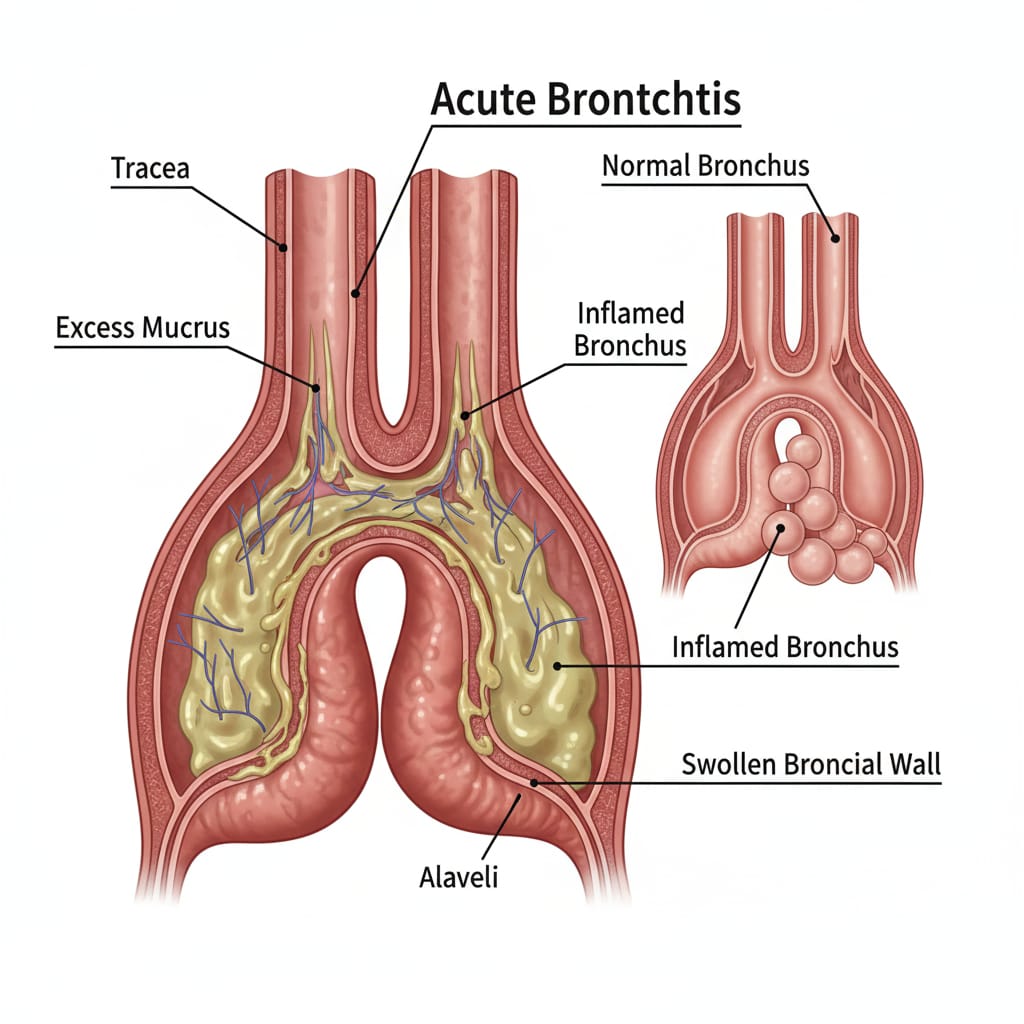Introduction
Acute bronchitis is one of the most common respiratory diseases seen in children and adults worldwide. It is an inflammation of the bronchial tubes—the airways that carry air into your lungs. This condition usually develops after a viral infection such as the common cold or influenza, and it leads to persistent coughing, chest discomfort, and breathing difficulties.

What is Acute Bronchitis?
Acute bronchitis is a short-term inflammation of the bronchi (the large air passages in the lungs). It usually develops quickly and lasts for a few days to a few weeks. Unlike chronic bronchitis, which is a long-term condition often associated with smoking and COPD (chronic obstructive pulmonary disease), acute bronchitis is temporary and often triggered by infections.
Key Points:
- Acute bronchitis is mostly caused by viral infections.
- Symptoms often include cough with mucus, fatigue, fever, and wheezing.
- It is more common in winter and during seasonal flu outbreaks.
Causes
- Viral Infections
- Most common cause of acute bronchitis.
- Viruses such as influenza, rhinovirus, respiratory syncytial virus (RSV), and coronavirus are often responsible.
- These viruses infect the lining of the bronchi, leading to inflammation and mucus production.
- Bacterial Infections
- Less common but possible.
- Bacteria such as Mycoplasma pneumoniae, Chlamydophila pneumoniae, or Bordetella pertussis can cause acute bronchitis.
- Environmental Irritants
- Cigarette smoke (both active and passive smoking).
- Air pollution, industrial fumes, and dust.
- Allergens such as pollen and mold.
- Risk Factors
- Infants, young children, and elderly people.
- People with weakened immune systems.
- Individuals with asthma, allergies, or chronic lung disease.
Symptoms
The symptoms of acute bronchitis can vary depending on the severity and cause.
Common Symptoms:
- Cough (lasting more than 5 days, often productive with mucus).
- Chest discomfort or tightness.
- Shortness of breath.
- Fatigue and weakness.
- Slight fever and chills.
- Wheezing sounds when breathing.
Sputum Characteristics:
- Initially clear and watery.
- Later may become yellow or green due to infection.
- Duration of Symptoms
- Cough may persist for 2–3 weeks even after other symptoms improve.
Complications
- Pneumonia (when the infection spreads to the lungs).
- Chronic bronchitis in people with repeated episodes.
- Exacerbation of asthma or COPD.
Diagnosis
- Medical History
- Duration and type of cough.
- Exposure to sick individuals or irritants.
- Past medical conditions like asthma or COPD.
- Physical Examination
- Listening to the lungs with a stethoscope.
- Checking for wheezing, crackles, or abnormal breath sounds.
- Diagnostic Tests (if needed)
- Chest X-ray: To rule out pneumonia.
- Sputum culture: To check for bacterial infection.
- Blood tests: To identify infection or inflammation.
- Pulmonary function test: In recurrent cases to check lung health
Treatment of Acute Bronchitis
- Home Remedies and Self-Care
- Rest: Adequate sleep and reduced activity.
- Hydration: Drinking warm fluids like soups, teas, and water.
- Humidifier: Keeping the air moist to ease breathing.
- Honey and warm drinks: Soothe throat irritation.
- Medications
- Cough suppressants (for dry cough).
- Expectorants (to loosen mucus).
- Pain relievers and fever reducers (acetaminophen, ibuprofen).
- Bronchodilators (for wheezing and breathing difficulty).
- Antibiotics: Only if bacterial infection is confirmed.
- Hospitalization
- Rare, but may be required in severe cases with breathing difficulties, pneumonia, or weak immunity.
Prevention of Acute Bronchitis
- Preventing acute bronchitis requires reducing exposure to infections and irritants.
- Lifestyle Measures
- Avoid smoking and secondhand smoke.
- Use masks in polluted areas.
- Maintain proper hygiene (handwashing, sanitizers).
- Get enough sleep and exercise to boost immunity.
- Vaccinations
- Flu vaccine (annually).
- Pneumococcal vaccine (for high-risk groups).
- Pertussis vaccine (especially for children).
When to See a Doctor
- Seek medical attention if you experience:
- Cough lasting more than 3 weeks.
- High fever (above 102°F/39°C).
- Cough with blood.
- Shortness of breath or chest pain.
- Wheezing not relieved by medication.
FAQs on Acute Bronchitis
Q1. Is acute bronchitis contagious?
Yes, viral acute bronchitis is contagious and spreads through coughing, sneezing, or contact with contaminated surfaces.
Q2. How long does acute bronchitis last?
Usually 1–3 weeks, though cough may linger longer.
Q3. Can acute bronchitis turn into pneumonia?
Yes, especially in elderly or immunocompromised individuals.
Q4. Do antibiotics work for acute bronchitis?
Not usually, since most cases are viral. Antibiotics are only given if bacterial infection is confirmed.
Q5. Can children get acute bronchitis?
Yes, children are commonly affected, especially after colds or flu.
